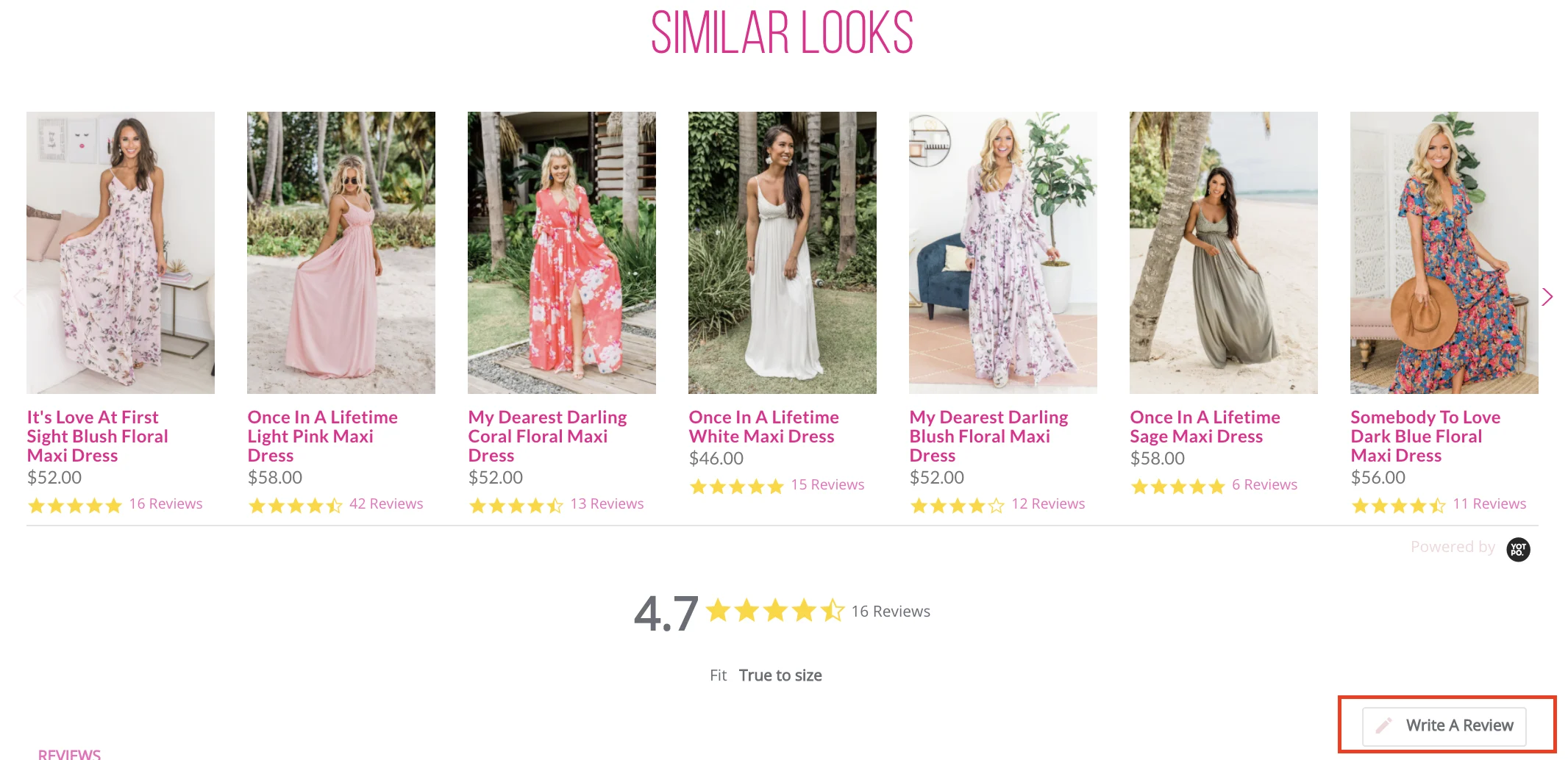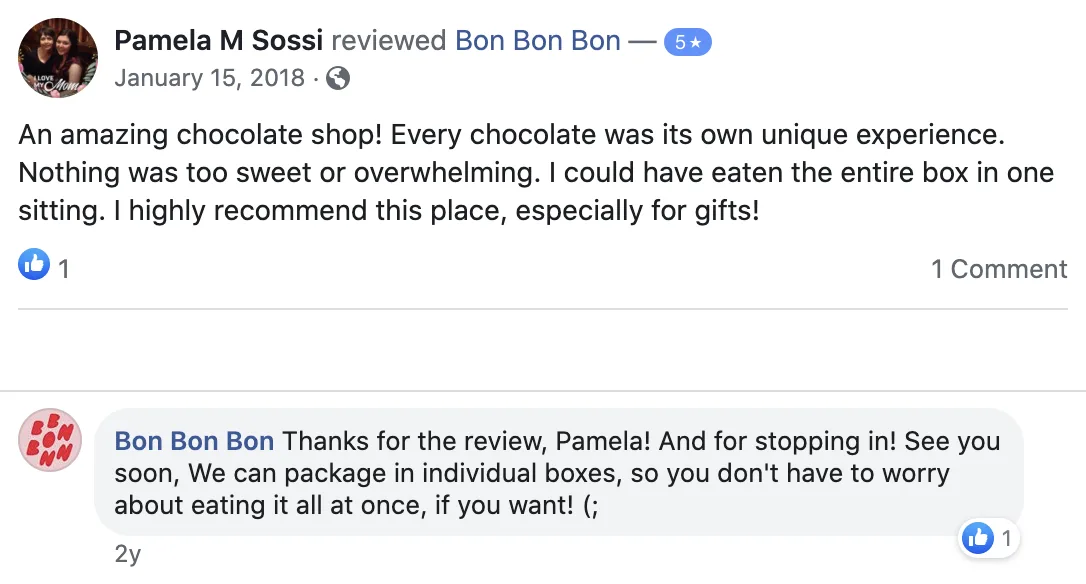The Inside Scoop on Ecommerce Reviews: Why They Matter and How to Make the Most of Them


The Inside Scoop on Ecommerce Reviews: Why They Matter and How to Make the Most of Them
Get The Print Version
Tired of scrolling? Download a PDF version for easier offline reading and sharing with coworkers.
A link to download the PDF will arrive in your inbox shortly.
When you go to make an online purchase, what’s the first thing you do? In an ecommerce-driven world where customers can’t physically experience products before purchasing, many consumers turn to online product reviews.
As online review sites such as Yelp! and Facebook have expanded, finding an opinion on just about anything is only a few clicks away. The proliferation of reviews has even gone so far as to shape how businesses are perceived online.
As Chris Anderson, businessman and current head of TED, puts it, “Your brand isn’t what you say it is — it’s what Google says it is.”
For any company that exists in the digital space, online reviews are critically important when it comes to winning business and maintaining a positive reputation.
Who is Reading Online Reviews?
In today’s web-based world, virtually everyone is reading online reviews. In fact, 91% of people read them and 84% trust them as much as they would a personal recommendation. The effects of reviews are measurable, too.
The average customer is willing to spend 31% more on a retailer that has excellent reviews.
Negative reviews can carry as much weight as positive ones. One study found that 82% of those who read online reviews specifically seek out negative reviews.
That may sound alarming — this stat only emphasizes that negative reviews aren’t going unnoticed — but there are some benefits: Research indicates that users spend five times as long on sites when interacting with negative reviews, with an 85% increase in conversion rate.
Customers like to see lots of reviews. A single review with a few positive words makes up an opinion, but a few dozen that say the same thing make a consensus. The more reviews, the better, and one study found that consumers want to see at least 40 reviews to justify trusting an average star rating. However, a few reviews are still better than no reviews.
One study found that, on average, products are 270% more likely to sell with as few as five reviews.
With the vast array of review sites and the level of trust most consumers have in reviews, it’s a safe assumption that virtually everyone considering your products, no matter your target demographic, industry, or market, is reading online reviews before making a purchase.
Online Reviews are Essential for Your Online Store
Online reviews can reveal a lot about your online store. A wealth of positive words can have a measurable impact on your sales, driving purchases and creating a base of consumers who will stand behind you and your product. These key points outline the benefits that make online reviews are essential for your online store.
1. Drive sales.
Social proof refers to the psychological phenomenon in which people make judgments and decisions based on the collective actions of others. In this case, reading positive reviews from other people who made similar purchases drives confidence that buying a well-reviewed item is a good choice.
In essence, people want proof from other consumers that a product or service is worthwhile, not just biased advertising from brands. Reviews are trusted 12 times more than other marketing materials, demonstrating that social proof is a powerful force.
2. Build trust.
The global ecommerce market reached nearly $3.5 trillion in 2019. There are countless brands in every category, but without a way to verify quality and reliability, it’s hard to know who to trust.
While handling a product is the best way to gauge quality, reviews can be the next best thing for businesses that exist solely in the ecommerce space. Reading dozens of reviews that indicate good quality and services create an online reputation that customers can trust. In fact, customers are 63% more likely to trust and buy from a company with reviews.
3. Contribute to SEO efforts.
Ranking high in the SERPs is a goal for most businesses. However, building an SEO-friendly web presence can take a lot of time and energy. Fortunately, customer reviews can further your mission without you lifting a finger.
Most customers use keywords, like the name of the products, in their reviews, adding more content on the internet associated with you. That can benefit you twofold: your name is more likely to appear when web users search keywords related to your store, and they’re most likely to see your positive reviews.
4. Aid customer decision-making.
When purchasing online, the customer decision-making process becomes a lot more complicated. As such, most shoppers put a lot more time and energy into evaluating products, reading reviews, and comparing items with one another before pulling the trigger.
Reviews are key to the decision-making process, helping customers to get a better idea about the product, including material, size, and shape. For example, a product may look too small to meet consumer needs in a picture, but customer reviews that address size more accurately can put a wary shopper at ease.
5. Enable problem-solving.
Not all reviews are positive and, believe it or not, that’s okay. No business is perfect, and reviews can help you identify pain points in need of improvement. Some negative reviews misinterpreted a situation or have been written by an angry customer.
Still, if you see multiple negative reviews with similar complaints, you may have a problem worth addressing. If 15 different reviews praise your products but disparage your clunky checkout process, for example, it may be time to invest in creating a smoother, more efficient purchase process.
An astounding 94% of online consumers have been dissuaded from shopping based on negative reviews, so remedying the problematic trends you see can definitely be beneficial.
Maximize The Benefits of Online Reviews
The value in online reviews is quite clear, but understanding why reviews are a benefit and how to leverage them to your advantage are two different things. These tips can help you maximize the benefits of what online reviews can do for you.
1. Increase brand awareness.
Ideally, your brand will exist in as many places as possible on the web so customers will know your name, who you are, and what you do. Reviews across many sites can do the heavy lifting for you, increasing your presence organically. For example, strong reviews on Yelp! can ensure your brand comes up at the top of the list when customers search for companies in your industry.
2. Identify keywords for your products and services.
You probably have keywords in mind for your business, but that doesn’t mean the words and phrases you associate with your company are the same ones that your customers would use. By reading reviews, you can tap into the words and phrases most commonly used by your consumers and fine tune the keywords you use in your SEO campaigns accordingly.
3. Highlight positive reviews with PR and influencer campaigns.
When you have positive reviews, showing them off is powerful. Instead of making claims that your products are great, let your reviews do the talking for you. Featuring reviews on your page, in press releases, in marketing content, or, if your budget allows, in advertising promoted by influencers, can be a perfect way to ensure that your positive reputation is widespread.
6 Tactics for Receiving Online Reviews
In many cases, customer reviews will come naturally over time, but that doesn’t mean you can’t speed up the process. By employing tactics to receive online reviews, you can increase the number of customers who leave feedback.
1. Ask for a review.
Want reviews? Just ask. Sometimes, getting a customer to leave a review is as simple as asking for one. Whether on your checkout page, as a pop-up after making a purchase, or as an email request after item delivery has been confirmed, simply requesting feedback can make a big difference.
Larq sends follow-up emails asking customers what they think about their new water bottles. Some storefronts take this a step further by including QR codes, links to Yelp! pages, or fillable forms to eliminate all labor on the part of the consumer.

2. Make it easy for customers to leave a review.
If you make your customers jump through hoops to leave you a review, it’s unlikely you’re going to get much feedback. Instead, make it as easy as possible. Include links to your Facebook, Google My Business, and Yelp! pages in marketing emails and on your webpage.
Also, consider adding a simple review submission form, similar to Pink Lily, on the bottom of your website and product pages so customers are able to leave notes without leaving your site.

3. Incentivize your customers.
Customers love things like discounts and free shipping, so offering these perks in exchange for a review can be a good way to make progress. The expense to you is incremental, and the benefits to a solid foundation of reviews can far outweigh the cost.
A few days or weeks after a purchase, simply send out an email asking for feedback in exchange for a small incentive. It can be in the form of a discount on a next purchase, a promo code for free shipping, or even participation in a rewards program. Overstock, for example, incentivizes reviews by giving customers credits for future purchases.
If you choose this strategy, don’t hinge receiving a benefit on leaving a positive review. You want honest reviews, not fake feedback. Artificially inflated reviews can feel like a bait and switch, especially when customers make purchases based on reviews only to later learn the reviews were paid and not organic.
4. Send customer surveys.
Surveys can be a great way to solicit feedback on all parts of your company — even areas customers may not normally be inclined to mention. After a completed purchase, sending out an email that asks customers to rate factors like ease of navigation, checkout process, shipping speed, and product quality can give you valuable feedback you can display on your site. And, when you include a section for comments, you can quickly and easily curate a collection of reviews to show off.
5. Engage in customer feedback.
Customers like to be heard, and that includes responses to reviews. Google likes this, too — answering reviews can actually bolster local SEO efforts.
Instead of making reviews a secondary part of your process, carve out time specifically to address reviews like Bon Bon Bon has.

Even a simple “Thanks!” can go a long way in ensuring a customer feels cared about. When new customers see that you’re reading and acknowledging feedback, they’ll be more likely to contribute their thoughts, too.
Responding to reviews shouldn’t be limited to positive notes. One study found that business follow-ups after leaving a negative review resulted in 34% of customers deleting their negative reviews entirely.
6. Automate the ask.
Asking for reviews doesn’t have to be a manual process. By establishing an automated email that goes out a week or so after a purchase, you can contact customers for review requests while your products are still fresh in their minds. You can also use cookies to track website visitors and generate pop-ups accordingly. These kinds of tactics require little effort on your part but can still result in big rewards.
Earn Online Reviews on the Most Authoritative Review Sites
Good reviews are great, but some are more valuable than others. Consumers appreciate reading all reviews, but those on third-party sites that can’t be manipulated often carry more clout than those on sites businesses own. Sites like Google, Yelp!, and Facebook reviews are the most valuable to consumers, providing feedback that’s associated with real accounts linked to actual identities.
These are the most useful resources for collecting online reviews.
1. Google reviews.
Google is seen as an authority in all things web, and that includes reviews. Google My Business is a valuable source of information, offering everything from contact details to hours of operation to millions of web users, and the reviews section is beneficial as well. Easy to access and tied to individual businesses in a way that eliminates confusion, Google reviews can be among the most meaningful for your reputation as a retailer.
Due to the role reviews play in Google’s algorithms, Google reviews are arguably among the most crucial avenues available. As previously mentioned, Google takes reviews into account in determining search engine rankings, with reviews comprising around 9% of the total formula.
2. Yelp! reviews.
A top name used for businesses of all shapes and sizes, Yelp! has been a critical player in the review market for over 15 years. While the site has been the source of controversy with claims that positive reviews are deleted if businesses don’t agree to advertise on Yelp!, it’s still one of the most trusted names in the game.
Unlike Google and Facebook, which show all reviews, Yelp! uses a proprietary algorithm to favor some reviews over others, hiding the remainder under a small heading at the bottom of the page that reads “reviews that aren’t currently recommended.” This in itself gives weight to reviews written by people with a strong site presence or constructive information to share, rather than new accounts with responses of only a word or two.
Regardless of how businesses feel about how the site operates, Yelp! reviews carry a lot of sway in the online community — a single star increase can lead to as much as a 9% boost in revenue. Conversely, weak Yelp! reviews can be a serious detriment, with businesses under a three-star rating feeling the pinch.
3. Facebook reviews.
Facebook’s long-standing review program has seen some recent changes, which has resulted in a gradual shift from standard reviews to feedback integration. It lets Facebook users review as usual while also making recommendations that speak to business’ strengths.
According to Facebook, the system works. Roughly two in three Facebook users visit a local business page at least once a week, and one in three makes use of the review and recommendation system to influence buying decisions.
For a while, Facebook has allowed users to solicit recommendations, but these findings are now visible on the individual pages of the company. They provide an extra layer of detail to how businesses are viewed online, giving Facebook users an additional perspective that can inform buying decisions.
4. Niche online reviews.
While not as common as the big players, some ecommerce operations in niche markets — those specific to fandoms, for example — may also find value in smaller online outlets specific to consumers. Everything from forums to Reddit to personal blogs can function as a source of reviews for those in smaller markets, and in many cases, these kinds of posts can be far more valuable.
Small businesses may get lost in the hubbub of Google or Yelp! but can shine in a specialty space. Fans of Harry Potter, for example, may not make much headway on Facebook, but they are likely to find far more value in a write-up about your Potterhead store on a fantasy forum.
Soliciting reviews on these kinds of niche sites can be a little more challenging, especially for those used to relying on the obvious review sources for information, but it’s not impossible. Instead of generally asking for reviews, be more specific with requests. Provide links to profiles on places like industry pages, Reddit AMAs, or specialty forums, specifically for the analysis of pop-up requests or emails, to see the kind of feedback that will mean the most to your business.
Conclusion
Online reviews are an effective word of mouth marketing strategy in the digital age, providing outside perspectives on products and services. While positive reviews can drive revenue and build a trustworthy reputation, negative reviews or the absence of reviews can do the opposite. Understanding the importance of reviews as well as how to leverage them to boost your business can be a critical way to get ahead in the competitive ecommerce marketplace, positioning yourself miles ahead of the competition.

Brett Regan is an experienced writer specializing in SaaS and ecommerce topics, with a strong focus on helping businesses navigate the digital landscape. His work covers a wide range of subjects, from ecommerce strategies to platform solutions and innovations in online retail. With years of expertise, Brett's writing provides valuable insights for businesses looking to grow and succeed in the fast-paced world of ecommerce.


